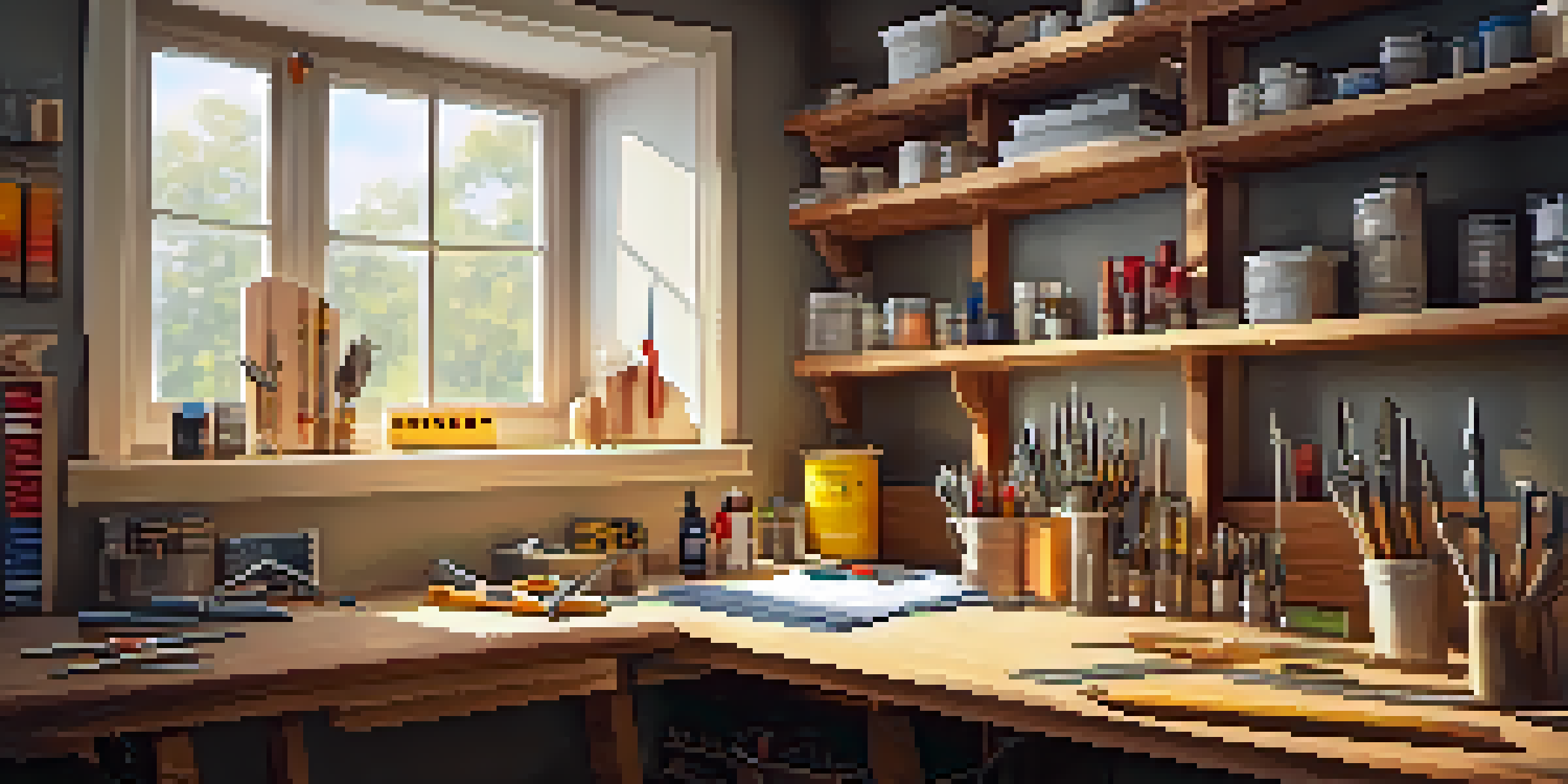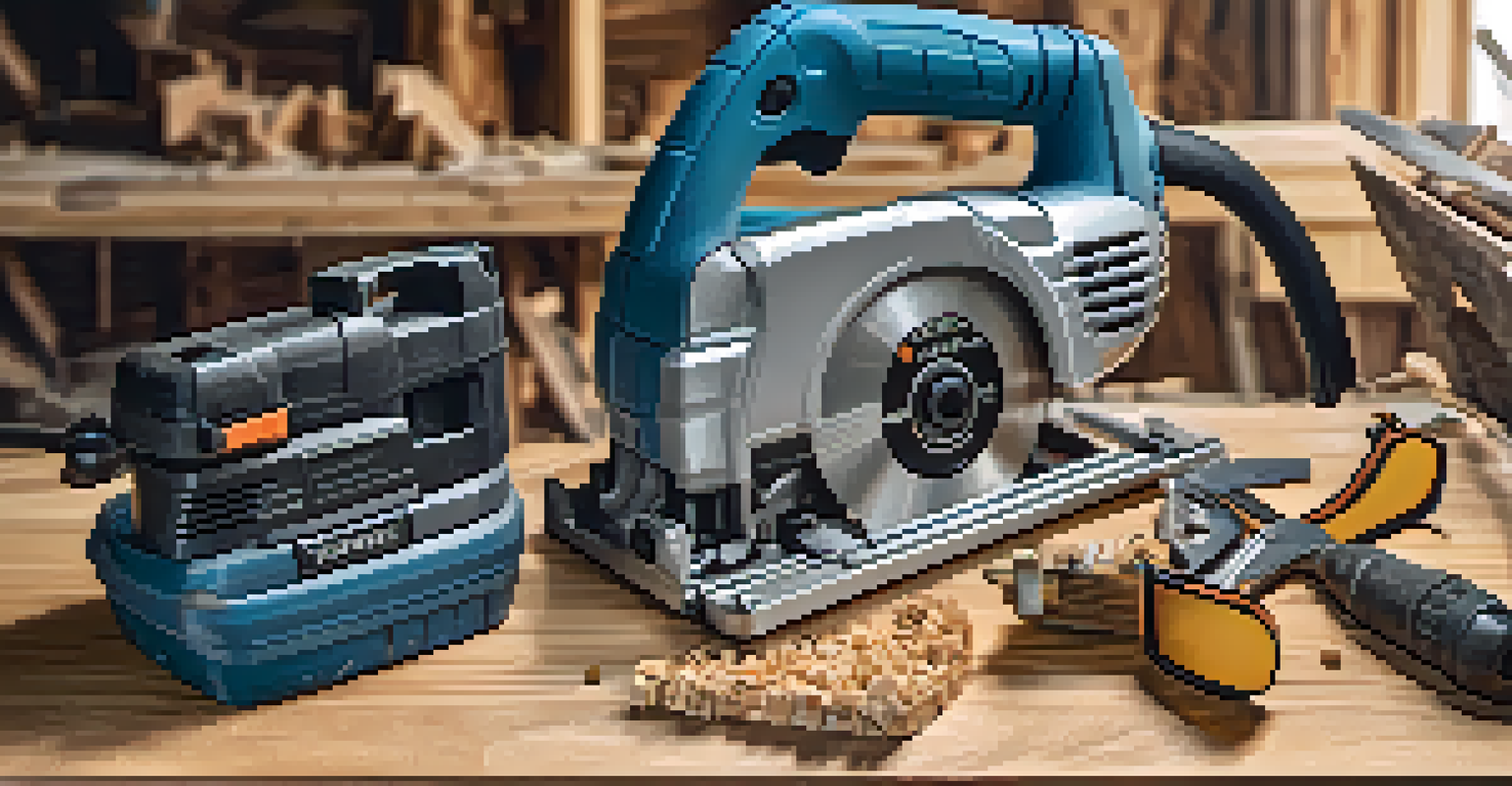Essential Tools and Materials for Home Renovation Projects

Basic Hand Tools Every DIYer Should Own
When starting any home renovation, having the right hand tools is essential. A good set typically includes a hammer, a set of screwdrivers, pliers, and a tape measure. These tools are the backbone of any project, allowing you to tackle various tasks with ease. For instance, a tape measure helps ensure precise cuts and placements, while a hammer is crucial for assembling or disassembling structures.
The bitterness of poor quality remains long after the sweetness of low price is forgotten.
Investing in quality hand tools can make a significant difference in your renovation experience. While budget options might seem appealing, durable tools will save you time and frustration in the long run. Think of it this way: using the right tools is like having the proper cooking utensils; they can make or break your culinary masterpiece.
Additionally, keep your hand tools organized. A toolbox or a tool belt can help you maintain order, making it easier to find what you need when you need it. This organization reduces downtime and enhances your efficiency during home improvement projects.
Power Tools to Speed Up Your Renovation
Power tools can transform how you approach home renovation tasks, making them faster and more efficient. Essential power tools include a cordless drill, a circular saw, and a jigsaw. A cordless drill is particularly versatile, allowing you to tackle everything from furniture assembly to installing shelves with ease.

Consider using a circular saw for larger cuts, such as slicing through plywood or framing lumber. This tool can save you significant time compared to manual cutting methods. On the other hand, a jigsaw is perfect for intricate cuts, like those needed for curved or detailed designs.
Essential Hand Tools for DIY
A good set of hand tools, including a hammer and tape measure, is crucial for any home renovation project.
While power tools make tasks quicker, safety should always be a priority. Invest in safety gear like goggles and gloves, and read the instructions carefully before using any new tool. This will help you enjoy your renovation projects without unnecessary risks.
Essential Materials for Structural Renovations
When renovating your home, understanding the essential materials for structural projects is crucial. Common materials include lumber, drywall, and insulation. Lumber serves as the backbone of most renovations, whether you're building new walls or framing a deck.
Safety isn't just a slogan, it's a way of life.
Drywall is another fundamental material, especially for interior renovations. It's used to create smooth wall surfaces, ensuring a polished look for your finished space. Insulation, on the other hand, is vital for energy efficiency, keeping your home comfortable year-round.
Always choose high-quality materials to ensure the longevity of your renovations. For instance, opting for moisture-resistant drywall in areas prone to humidity can prevent future issues. By selecting the right materials, you lay a strong foundation for your renovation success.
Finishing Materials for a Polished Look
Once the structural work is done, it's time to focus on finishing materials that add character and style to your space. Paint, flooring, and tiles are among the most popular choices. A fresh coat of paint can dramatically change the ambiance of a room, making it feel new and inviting.
Flooring options abound, from hardwood to laminate and tile. Each material offers unique advantages; for instance, hardwood is durable and timeless, while laminate can be more budget-friendly and easier to install. Tiles, especially in kitchens and bathrooms, provide both functionality and style.
Power Tools Enhance Efficiency
Using power tools like cordless drills and saws can significantly speed up renovation tasks while ensuring precision.
Don't forget about trim and molding! These finishing touches can elevate the overall aesthetic of your renovation. Consider matching these with your chosen paint colors and flooring to create a cohesive look throughout your home.
Safety Gear: Protecting Yourself During Renovation
Safety should never take a back seat during home renovations. Investing in safety gear like goggles, gloves, and dust masks is essential to protect yourself from potential hazards. Even simple tasks can kick up debris or expose you to sharp objects, making protective gear a must-have.
Consider using ear protection if you're working with loud power tools. Prolonged exposure to high noise levels can lead to hearing damage, so it's best to play it safe. Similarly, wearing a hard hat when working on overhead projects can prevent injuries from falling objects.
By prioritizing safety, you not only protect yourself but also create a more efficient work environment. Knowing you're safeguarded allows you to focus fully on your renovation tasks without added worry.
Measuring and Leveling Tools for Precision
Precision is key in any renovation project, and having the right measuring and leveling tools is vital. A good quality level ensures that your surfaces are straight and even, while a measuring tape helps you achieve accurate dimensions. These tools are essential for everything from hanging shelves to installing cabinets.
Additionally, laser levels can take your precision to the next level. These tools project a straight line across a room, making it easier to align features like cabinets and lighting fixtures. They can save you time and effort, ensuring your renovations look professional.
Safety Gear is a Must
Investing in safety gear such as goggles and gloves is essential to protect yourself during home renovations.
Remember, rushing measurements can lead to costly mistakes. Taking the time to measure twice and cut once is a mantra worth adopting to ensure your renovation runs smoothly.
Storage Solutions for a Smooth Renovation Process
A successful renovation often hinges on effective storage solutions. As you gather tools and materials, having a designated space to keep everything organized can streamline your workflow. Consider investing in storage bins, shelving units, or tool chests to keep your workspace tidy.
Labeling bins can also save you time, as it allows you to quickly find what you need without sifting through multiple containers. This simple practice can make your renovation experience much more enjoyable and efficient.

Moreover, decluttering your work area regularly helps maintain focus and reduces stress. By creating a clean, organized environment, you set the stage for a more successful renovation journey.